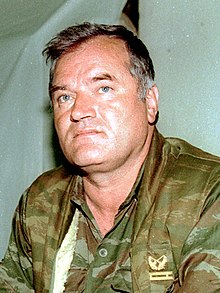Ratko Mladić
A long-time member of the League of Communists of Yugoslavia, Mladić began his career in the Yugoslav People's Army (JNA) in 1965.Mladić nevertheless managed to remain at large for nearly sixteen years, initially sheltered by Serbian and Bosnian Serb security forces and later by family.On 22 November 2017, Mladić was sentenced to life in prison by the ICTY after being found guilty of 10 charges, one of genocide, five of crimes against humanity and four of violations of the laws or customs of war.His mother, Stana (née Lalović; 1919–2003), raised her three children; daughter Milica (born 1940), sons Ratko and Milivoje (1944–2001), by herself after the death of her husband in 1945 during World War II.Beginning with the rank of second lieutenant in April 1968, he proved himself to be a capable officer, first commanding a platoon (May 1970), then a battalion (27 November 1974), and then a brigade.In September 1976, Mladić began his higher military education at the "Komandno-štabne akademije" in Belgrade, finishing in first place with a grade of 9.57 (out of 10).That year, Mladić was given command of the 9th Corps, and led this formation against Croatian forces in Knin, the capital of the self-declared Republic of Serbian Krajina.The JNA forces under his command participated in the Croatian War, notably during Operation Coast-91 in an attempt to cut off Dalmatia from the rest of Croatia, which resulted in a stalemate (the Croats held the entire coastline near Zadar and Šibenik, and Serb Krajina expanded its territory in the hinterland).On 12 May 1992, in response to Bosnia's secession from Yugoslavia, the Bosnian Serb Parliament voted to create the Army of Republika Srpska (VRS, in short).[15][16] On 4 August 1995, with a huge Croatian military force poised to attack the Serb-held region in central Croatia, Radovan Karadžić announced he was removing Mladić from his post and assuming personal command of the VRS himself.There were claims that he had been seen in a suburb of Moscow, and that he "regularly" visited Thessaloniki and Athens, which raised suspicions that numerous fake reports were sent to cover his trail.[12] In early February 2006, portions of a Serbian military intelligence report were leaked to Serbian newspaper Politika which stated that Mladić had been hidden in Army of Republika Srpska and Yugoslav army facilities up until 1 June 2002, when the National Assembly of Serbia passed a law mandating cooperation with the ICTY in The Hague.[30] The then-Chief General of the Yugoslav Army Nebojša Pavković requested that Mladić vacate the facility where he was staying on mountain Povlen, near Valjevo, after which the Serb military agencies claim to have lost all trace of him.[32][33][34] In 2004, Paddy Ashdown, then-United Nations High Representative in Bosnia and Herzegovina, removed[35] 58 officials from their posts due to suspicions that they helped war crimes suspects including Mladić and Karadžić to evade capture.[38] It was revealed in December 2004 that the Army of Republika Srpska had been harboring and protecting Mladić until the summer of 2004, despite repeated and public pleas to collaborate with the ICTY and apprehend war criminals.On 6 December, NATO said that Mladić visited his wartime bunker during the summer in order to celebrate Army of Republika Srpska Day.[40] However, ICTY Prosecutor Carla Del Ponte denied the rumors that Mladić had been arrested, saying that they had "absolutely no basis whatsoever".The EU considered Mladić's arrest, along with full cooperation with the ICTY, pre-conditions that had to be met before Serbia could join the organization.The previously unseen images show Mladić in various restaurants and apartments and at what appears to be military barracks in Serbia, almost always accompanied by his wife Bosa and son Darko.After some initial doubt as to the identity of the arrested, Serbian President Boris Tadić confirmed it was Mladić at a press conference and announced that the process of extraditing him to the ICTY was underway.[65] In 2017, the International Criminal Tribunal for the former Yugoslavia (ICTY) convicted Mladić on 10 charges: one of genocide, five of crimes against humanity and four of violations of the laws or customs of war.[71] In January 2019, the pre-appeals chamber partially granted a prosecution request and struck three of five motions which Mladić filed to submit new evidence.[73] On 13 June 2019, it was announced at a status conference that Mladić was diagnosed with "harmless arrhythmia" and scheduling for the potential appeals hearings still had not started either.[75] On 3 September 2020, the five judge panel representing the MITC's Appeals Chamber voted 4–1 to reject Mladić's request for future hospitalization outside his Hague detention center.There are also conflicting opinions on the reason for her suicide, with one of the more common theories being that she was under immense pressure from the general public as her father was frequently chided and scrutinized in the Serbian newspapers for his actions against civilians in Bosnia.



his trialBožanovićiGrand county of VrhbosnaIndependent State of CroatiaSerb DemocraticLeague of CommunistsConviction(s)GenocideWar crimesCrimes against humanityLife imprisonmentBosnia and HerzegovinaYugoslaviaSerbian KrajinaRepublika SrpskaYugoslav People's ArmyArmy of Republika SrpskaColonel-generalVRS General StaffCroatian War of Independence1991 Yugoslav campaign in CroatiaSiege of KijevoOperation Coast-91Battle of ŠkabrnjaOperation Tiger (1992)Operation StormBosnian War1992 Yugoslav campaign in BosniaBattle of Kupres (1992)Operation Vrbas '92Operation CorridorOperation Bosanska KrajinaTreskavica FrontMajevica front (1992–1995)Kalesija and Kamenica offensiveBrčko offensiveOperation Lukavac '93Operation Star '941994 Goražde air strikesBattle of Kupres (1994)Operation "Breza '94"Operation Shield 94Operation SpiderOperation Winter '94Siege of SarajevoSiege of GoraždeSiege of SrebrenicaSiege of ŽepaOperation Krivaja '95Operation Summer '95Operation Stupčanica '95Siege of BihaćOperation MajevicaOperation Tekbir '95Operation Deliberate Force1995 Pale air strikesOperation SanaOperation Prijedor 95Serbian CyrillicBosnian SerbYugoslav WarsInternational Criminal Tribunal for the former YugoslaviaThe HagueLeague of Communists of YugoslaviaGeneral Staffinternational arrest warrantLazarevoSerbia being awarded candidate status for European Union membershipcommand responsibilitySrebrenica massacreYugoslav PartisansUstašeNazi GermanyFascist ItalyKingdom of Yugoslaviahome villageAnte PavelićSarajevowhitesmithSkopjePrištinaBosnian GenocideSocialist Autonomous Province of KosovoKosovo SerbsAlbanianRepublic of Serbian KrajinaCroatian WarDalmatiaCroatiaMilan Martićbattle of ZadarBosnia and Hercegovinasniper shootingBosnian Serb ParliamentRadovan KaradžićSemberijaKrajinaDrina river valleyDrina riverKrajišnikNATO air strikessafe areasSrebrenicaBosniaks8,300 were murderedfallen to the Croatian armyFikret Abdićshelling of entire BihaćGoraždeSarajevo airportBiljana PlavšićHan PijesakMontenegroPolitikaYugoslav armyNational Assembly of SerbiaNebojša PavkovićPovlenValjevoSlobodan MiloševićPaddy AshdownNew BelgradeSerbianDrobeta-Turnu SeverinCarla Del PonteEuropean Union